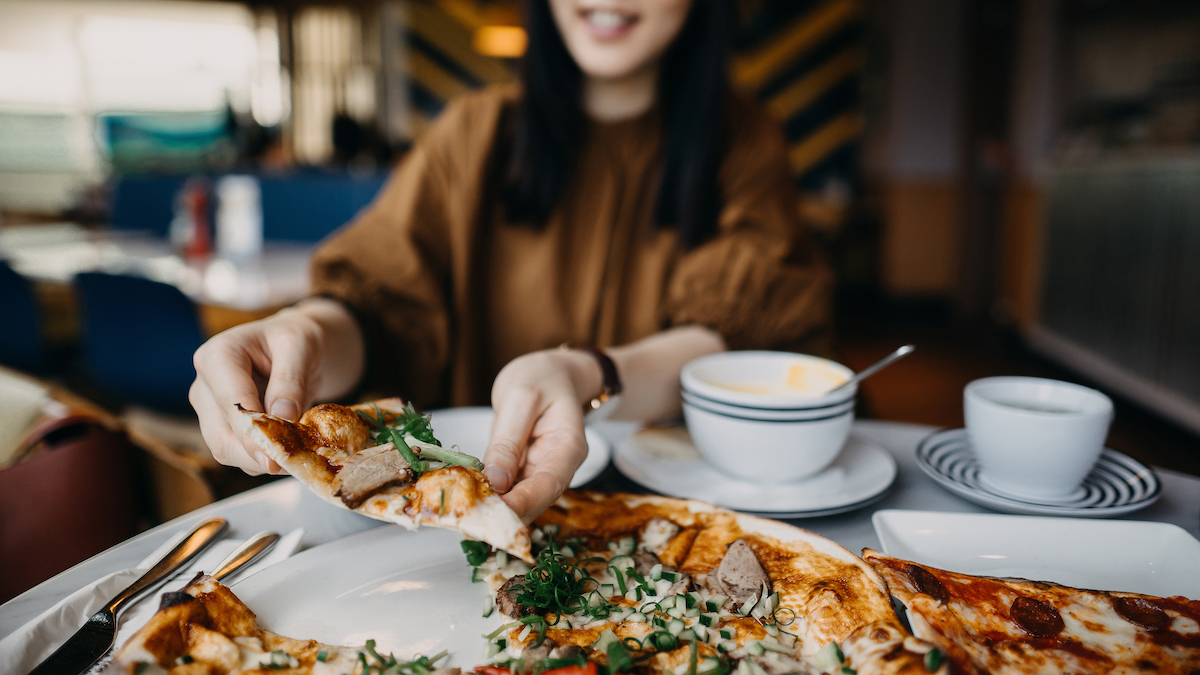Struggling to sleep at night? You’re not alone. Around 32.8% of adults in the US are sleep-deprived, according to a 2024 survey.
While you may tend to pay attention to investing in the best mattress for your body type and sleeping position, and in having an elaborate nighttime routine, forgetting how your eating habits impact your sleep can have serious consequences.
Various studies suggest that stomach issues can disrupt your sleep, stopping you from getting the recommended hours of rest. This is why we reached out to experts to understand the specific eating habits to avoid before bed for a well-rested night’s sleep. Here’s what they had to say…
5 eating habits to avoid for better sleep at night
1. Heavy or large meals at night
Heavier the meal, better the sleep? Experts say this is a wrong notion indeed. While it may feel like a heavy meal induces sleep faster, it actually increases your cortisol levels and disrupt your sleep routine.
“Large meals increase core body temperature and activate digestion—both of which can delay sleep onset and lead to more nighttime awakenings,” explains Dr. Leah Kaylor, a clinical psychologist who specializes in sleep and trauma.
The rise in core body temperature also suppresses the release of melatonin (the sleepy hormone) which means you take longer to fall asleep and get enough rest.
2. Acidic or too spicy foods before bed
Spicy wings and carbonated drinks might seem like the perfect dinner combo but it can also wreak havoc on your sleep.
This is because spicy or acidic foods can trigger acid reflux — a condition when acid and bile travels up the esophagus which can result in symptoms such as bloating, heartburn or regurgitation.
“Eating spicy or acidic foods too close to bed will increase the risk of acid reflux, especially when lying down, which can wake you from sleep or prevent deep sleep,” says Dr. Kaylor.
3. Desserts after dinner
Research shows that a higher intake of sugar before bed can impact your sleep quality significantly. Sugary snacks are common go-to stress buster to turn to in the middle of the night, but it will only delay your sleep further.
“Snacking on high-sugar or high-fat foods can disrupt blood glucose stability,” says Dr. Kaylor.
And how does it affect your sleep? “This can lead to nighttime awakenings due to sugar crashes or digestive discomfort,” she adds.
4. Caffeinated food and drink
“Consuming caffeine late in the day can reduce slow-wave sleep,” says Dr. Kaylor. We all know that a cup of coffee makes us more awake than sleepy and so should be strictly avoided before bed. However, caffeine is also an element found it certain types of food too.
Top of the list you’ll find chocolate and energy bars. While these may seem fairly harmless or even healthier than fried and greasy foods, these include caffeine, which is strong stimulant that can interfere with your sleep.
Depending on various factors like your age and body weight, caffeine can last in your system anywhere between 2-12 hours. Experts, therefore, recommend staying away caffeinated-food and drinks in the later half of the day.
5. Certain veggies and legumes
It’s not just processed, fried or spicy foods; certain vegetables too can prove to be a bad match for your sleep.
“Cruciferous vegetables (like broccoli, cabbage, cauliflower) are rich in fiber and raffinose, which can cause gas and bloating,” explains Dr. Kaylor.
Similarly legumes like beans and most types of lentils can produce gastrointestinal discomfort and distention if not properly digested before bed. Or as we commonly say, these could be “gassy”.
The result? You’ll be tossing and turning in your sleep and then wake up feeling groggy and sluggish in the morning.
How does eating close to bedtime affect your sleep?
Experts recommend leaving a window period of two hours between your last meal of the day and your bedtime.
“Laying down after eating can significantly increase your risk to having acid reflux which can be disruptive to your ability to sleep,” says Dr. William Lu, Medical director at Dreem Health.
As we mentioned, the digestive process can also increase your core body temperature which works against the body’s natural need to cool down in preparation to rest at the end of the day. This can interfere with melatonin production and result in delaying sleep latency (time taken to fall asleep).
3 healthy bedtime snacks to have instead
Don’t want to go to bed hungry? There’s no need for that; here are some delicious bedtime snacks that can actually help you sleep better…
1. Summer fruits like kiwis, strawberries and pineapple
Not all food is a problem; some, such as summer fruits including kiwi, strawberries and pineapple, can even promote sleep.
These include sleep-friendly nutrients like vitamins, antioxidants, melatonin and magnesium which can improve your overall sleep quality considerably.
Have them as-is, or in lovely smoothies or berry bowls as a great nighttime snack before hitting the bed.
2. Oatmeal
Oatmeal can work well for your sleep in two ways. Firstly, it can keep you full for longer, so goodbye to nighttime hunger pangs. Secondly, it can reduce sleep issues and promote better rest.
In a study on athletes, it was found that whole grains had a positive impact on their sleep issues. Plus, you can add in milk to oatmeal, which is known to be a powerhouse of tryptophan— which results in melatonin and serotonin production, translating to rest and relaxation.
3. Mixed nuts
Too lazy to cut fruits or whip up an oatmeal? Just grab a handful of mixed nuts. These are not just great for your sleep (thanks to the magnesium present in them) but also your gut.
Nuts like almonds and walnuts are natural sources of magnesium, melatonin and tryptophan, three big sleep-friendly ingredients. However, it’s best to opt for unsalted options, since a high level of sodium can result in sleep disturbances.
Source link
